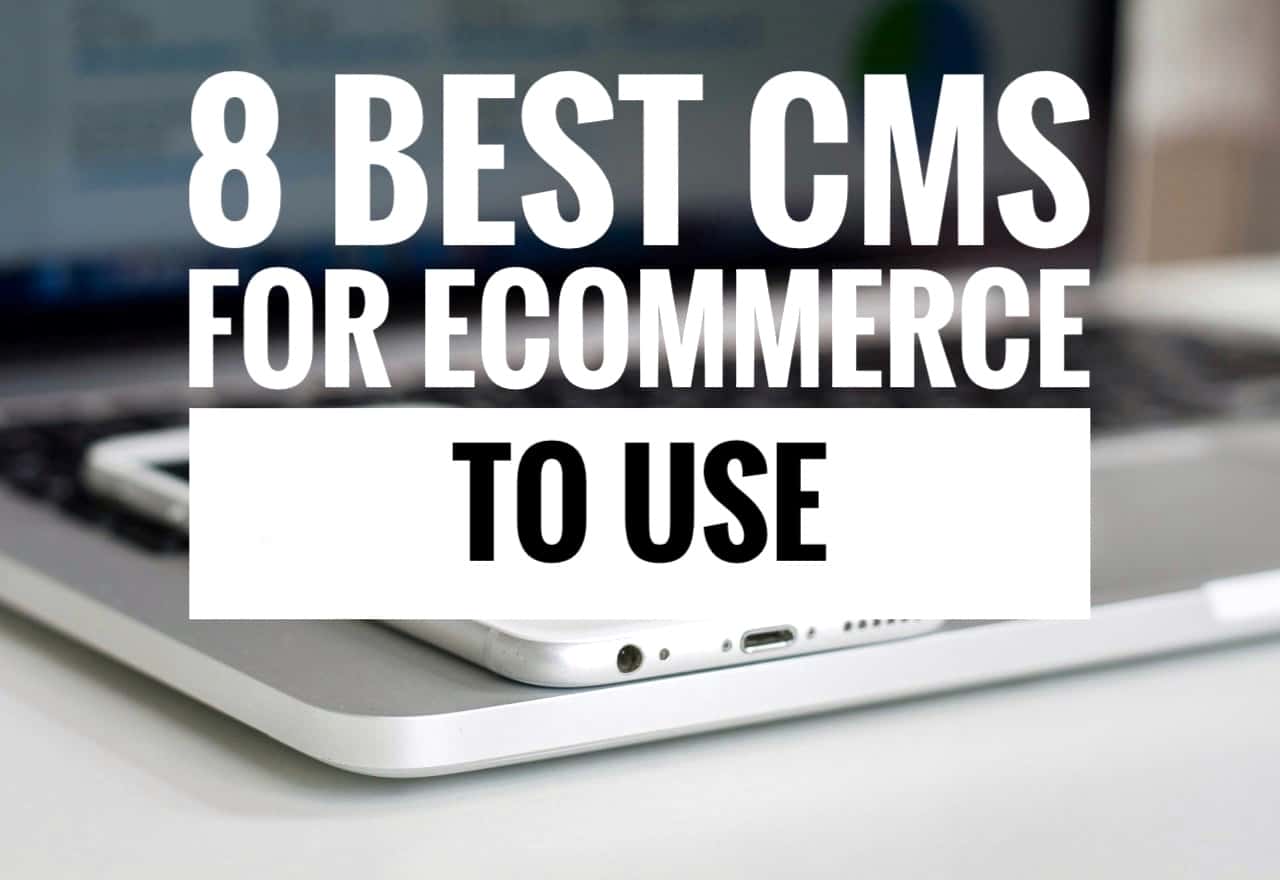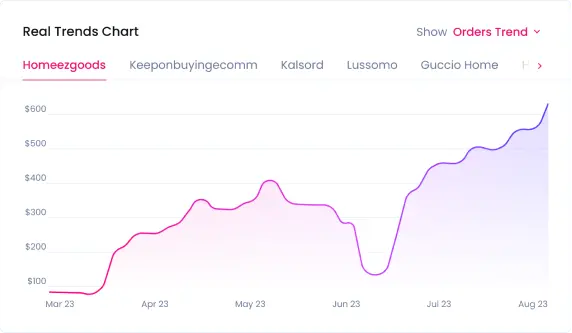8 Best CMS for Ecommerce to Use
Contents

Are you searching for the best CMS (Content Management System) for eCommerce to launch your online store this 2022? Search no more because you have found the best 8 of them.
By the way, what is CMS all about, and what’s the big deal with it?

If you want to build a website, you can choose between two broad options: build from scratch or use a CMS.
Building from scratch is ideal if your coding skills are top-notch – or you are willing to hire a developer. The advantage of this approach is that you can design your website however you want. This means great flexibility and control.
However, on the flip side, it can be time-consuming and grossly ineffective. It might take you months to build a robust and functional eCommerce website.
For this reason, you are better off using a Content Management System. CMS lets you set up an eCommerce quickly with minimal coding. The cool part is that it allows you to create product pages, blog content, etc., easily.
In this post, we will review the eight best CMS for eCommerce in 2022. We will review their strength and weakness and give our unbiased opinion about them.
Let’s get into it.
What Are Content Management System Ecommerce Platforms?
In basic terms, a Content Management System is a software solution, usually cloud-based, that makes it easy for you to create and manage content online.
Beyond creating and managing content, CMSs allow you to create stunning websites – and even host them online – without knowing a lick about coding.
Case in point: Sell the Trend.
Sell the Trend comes with an intuitive editor that makes it easy for you to build an elegant dropshipping website in minutes; no coding is required.

More details on Sell the Trend shortly.
Another good example of an eCommerce CMS is Shopify. With Shopify, you can design and set up your eCommerce website, host it online, purchase a domain name, create posts and pages, manage payments, and lots more.
Most CMSs make optimizing your eCommerce website for search (SEO) easy. This means you don’t have to worry about submitting your site map to Google, adding tags to your content, or creating rich snippets for your posts – all those are handled out of the box for you.
That said, the next thing to bother about is finding the right CMS for your dropshipping business.
The thing is, there are different types of CMS solutions on the market. This can make finding the right one for your business a bit of a challenge. But don’t worry; we will guide you through the process of picking the best one soon.
Types of CMS for Ecommerce
CMS for eCommerce falls into two broad types: SaaS CMS and Open Source CMS.
SaaS CMS
SaaS is the acronym for Software as a Solution. It’s a term used to refer to any cloud-hosted software solution that allows you to process customers’ payments, track your shipment, set up a website, manage your content online, etc.
This means you don’t have to install the software locally on your computer.
It then follows that a SaaS CMS is a content management system that allows you to create a website, publish and manage content exclusively online. To use, you only have to create an account.
Sell the Trend is a good example.

Shopify, BigCommerce, Wix, etc., are also other great examples.
One of the advantages of SaaS CMS is that very easy to use. More on that later.
Open Source CMS
A software solution is said to be open source if the source code of the software is open and accessible to anyone, not just a single individual or an organization.
Often, open-source software is free to use, and anyone can modify and add extra features to it.
Instinctively, open-source CMSs are free CMSs that you can use to build your eCommerce website.
WordPress is a typical example – and the most popular. Drupal and Joomla are also other good examples.

Unlike SaaS CMS, open-source CMS can be used both offline and online.
Top 8 CMS Platforms for Ecommerce
Here are the best eight eCommerce CMS solutions you can’t go wrong with:
1. Sell the Trend

And so we kick things off with Sell the Trend.
Putting Sell the Trend on spot #1 might look biased, but it isn’t. The reason is simple: Sell the Trend is packed with many features and tools that allow dropshipping merchants to set up and manage an online store easily – and fast!
To begin with, Sell the Trend is an Aliexpress partner. This means you can easily find winning products on Aliexpress and import them into your store using our chrome extension with a click of the button.
In addition, Sell the Trend comes packed with many marketing tools that make it easy to market your products online. Facebook audience builder, video ads creator, influencer engagement calculator, etc., are some of them.
What’s more, Sell the Trend makes it easy to automate dropshipping marketing, thanks to the robust store automation feature it comes with.
The cool part is that you can set up a website to sell your products, create fast-loading product pages, and manage your content without breaking a sweat with Sell the Trend.
Pricing: $39.97/month
Rating: 4.9/5.0
Key Features
- A.I (Artificial Intelligence) powered product research
- One-click product import from Aliexpress
- Influencer engagement calculator
- Store automation
- Website builder
- Large supplier database
- Automated order fulfilment
Pros
Sell the Trend makes it easy to set up a dropshipping store without hiring a designer or developer. Plus, it is easy to use.
Cons
The only thing you might not like about Sell the Trend is that it doesn’t have a free plan. But we offer free trials to users.
2. Shopify

Shopify is undoubtedly one of the biggest SaaS eCommerce CMSs on the market. Founded in 2006 in Canada, Shopify currently powers over a million eCommerce websites, including dropshipping stores.
What makes Shopify unique is that literally everything is taken care of for you when you sign up for an account. Hosting, domain registration, payment processing, and many more.
On top of that, Shopify has a huge collection of free and premium themes that you can easily access, ensuring you can never run out of design options when setting up your store.
As for SEO(Search Engine Optimization), Shopify is second to none for eCommerce CMS. Once you publish a page and optimize it by including target keywords, Shopify takes care of the rest to ensure that the page appears on Google.
Shopify is very flexible that both up-and-coming entrepreneurs and established enterprises with millions of dollars in revenue can use it.
Pricing: Shopify has three major pricing plans: Basic, Shopify, and Advanced plans, and they cost $24, $69, and $299 per month, respectively.
Rating: 4.85/5.0
Key Features
- Business name generator
- Website builder
- Logo maker
- Stock photography
- 100+ themes
- Web hosting
- SEO
- Marketing automation
- Email marketing
- 1000+ apps (free and paid)
Pros
Shopify is beginner-friendly. You can create a nice online store even if you have never built a website before and know little about eCommerce. Plus, almost everything is taken care of for you.
And you can always get help and support whenever you need it.
Cons
Setting up your eCommerce shop on Shopify can be a costly venture. You’d have to spend a lot on premium themes and apps to get things going.
3. WordPress/WooCommerce

WordPress, as we earlier highlighted, is a powerful open-source CMS solution that makes it easy to design and manage a website without stress.
But to use WordPress to set up an eCommerce website, you need to install a plugin on your website. While there are many plugins on the WordPress plugin repository, WooCommerce is the most popular.
WooCommerce currently powers over 4 million eCommerce websites.
The cool part about using WordPress to set up a dropshipping store is that you can create as many pages and posts as you wish with just a click of the button. And you can add as many different media to your pages: images, videos, audio, and many more.
Another reason to use WordPress is that it offers unlimited flexibility, allowing you to customize your eCommerce website however you please.
Like Shopify, WordPress has many free and premium themes running into thousands. The same goes for plugins.
The best part is that WordPress is free to use. You only have to pay for hosting and domain registration.
Price: Free
Rating: 4.8/5.0
Key Features
- Gutenberg/Classic editor for creating pages and posts
- Unlimited plugins and themes
- Powerful content management
- SEO-ready
Pros
Since it is a free, open-source CMS solution, WordPress is a cost-effective solution for eCommerce. Plus, it offers unlimited flexibility.
Cons
WordPress is more of a DIY (Do it yourself) solution. This means you need to know a thing or two about web development to use it efficiently. You might find the learning curve a bit steep.
Also, WordPress doesn’t offer customer support – you will need to seek help from experts or read support resources online whenever you need help.
4. BigCommerce

Next on our list of best CMS for eCommerce is BigCommerce.
BigCommerce is a headless CMS solution that makes it easy for teams to use and deliver content from one single source. In practice, this translates to faster load time and improved content deliverability.
With BigCommerce, you can easily create multiple stores across different regions and niches and manage them from the same spot.
BigCommerce comes with an easy-to-use drag-and-drop design editor that lets you create stunning, converting pages on your website from scratch. If you would rather use a theme than build from scratch, you can use any of BigCommerce’s customizable themes.
What’s more, BigCommerce makes it easy to create coupons and discounts for customers, optimize your page URLs for search engines, and many more.
Pricing: Starts at $29.95/month
Rating: 4.65/5.0
Key Features
- Lots of customizable themes
- Drag-and-drop design editor
- Customizable merchandizing
- Digital wallets
- SEO-ready
Pros
BigCommerce is a CMS of choice if you want to set up a multi-store. Additionally, it allows you to create customized product pages, thanks to its beginner-friendly design editor.
Cons
BigCommerce can be expensive to use. It can also be a bit difficult to use, especially if you know little about web development.
5. Wix

With over 500 customizable templates you can choose from, Wix is one of the few CMSs that make setting up an elegant storefront online easy.
In addition to editable templates, Wix comes with an intuitive drag-and-drop design editor you can use to design your web pages using a template or build from scratch.
Also, Wix has a robust dropshipping feature that makes it easy to import products into your online store.
What’s more, Wix offers secure online payment, allowing to process payments from customers without hassles.
Pricing: Wix’s basic eCommerce plan costs $17/month.
Rating: 4.6/5.0
Key Features
- Advanced, easy-to-use payment solutions
- Business insights
- Business automation
- Customizable checkout
Pros
One of the major upsides of using Wix is that it is beginner-friendly, making it easy to create nice web pages even if you have never built a website.
Cons
Wix doesn’t come cheap. Although it has a free plan, you can’t do much on the free plan. Another con is Wix’s SEO capabilities are limited compared with WordPress and Shopify.
6. Drupal

Sixth on our list of best CMS for eCommerce is Drupal.
Drupal is an open-source CMS solution that allows you to build a website, including eCommerce sites, and customize it however you wish.
With Drupal, you can conveniently manage your product inventory and carts, process payments, and promote your store.
One major drawback with Drupal is that, unlike WordPress, Drupal is limited in theme options. And setting up a nice-looking storefront with Drupal can be a challenge.
Nevertheless, Drupal has many features that make selling online a seamless experience.
Pricing: Free
Rating: 4.5/5.0
Key Features
- Marketing automation
- Multi-language support
- eCommerce personalization
- Advanced security
Pros
Drupal is free to use since it’s open-source. Also, Drupal offers top-notch security to eCommerce entrepreneurs.
Cons
Drupal has an unfriendly user interface, making it difficult for starters to use. Also, Drupal has a steep learning curve, unlike Wix or Shopify.
7. Joomla

Joomla is another CMS solution that allows you to create a website and manage your content online without trouble.
Although limited in terms of eCommerce, Joomla comes with many free and paid extensions/addons that allow you to convert your regular website into a full-blown eCommerce store.
Pricing: Free
Rating: 4.7/5.0
Key Features
- Multi-language support
- Loads of eCommerce extensions
- SEO-friendly
- Top-notch security
Pros
Joomla is free and will forever remain so. It’s backed by a large community of enthusiastic developers, ensuring you can always get help whenever needed.
Cons
Joomla is somewhat difficult to use and isn’t as flexible as WordPress. Also, Joomla has limited addons and extensions, unlike WordPress.
8. Magento

We wrap things up with Magento.
Magento is an open-source CMS solution that enables you to build websites, eCommerce stores, and web apps. Acquired in 2018 by Adobe, Magento has now been rebranded into Adobe Commerce.
With Magento, you can create and launch an online store, customize it to your heart’s content, publish and manage content, and manage multiple sales channels.
Pricing: $22,000 a year.
Rating: 4.6/5.0
Key Features
- Drag-and-drop page builder
- eCommerce AI
- Amazon sales channel
- Channel manager
- Mobile-centered
Pros
Magento offers greater flexibility than Joomla and is a lot easier to use. Plus, it is mobile-centric, ensuring your website flows well on mobile devices.
Cons
Magento is pretty expensive to use. You might spend as much as $22,000 a year just to use it to power your eCommerce store.
Why Do You Need a CMS For Your eCommerce Business?
Content Management Systems for eCommerce can be expensive and difficult, so why do we still recommend using them? Here are some reasons why:
SEO Friendly
If you were to manually create your web pages and posts instead of using a CMS, you’d have to also manually submit them to Google to make your website findable each time you add a new page or content.
That’s time-consuming and downright impractical.
However, using a CMS ensures your pages are automatically indexed on Google each time you publish a new post.
Optimized Product Pages
Creating optimized product pages that convert visitors into customers is a mix of art and science.
Creating one can be a serious challenge if you don’t have advanced coding skills.
CMSs allow you to create one without writing any code or hiring a developer.
Addon Integration
Using a CMS to build your eCommerce website makes it a lot easier to add advanced features and functionalities to your website, thanks to the numerous addon integration most of these CMSs come with.
Conclusion
So there you have it; the eight best CMS for eCommerce in 2022.
You don’t need to know a lick about coding to use these solutions, and you can start with them as soon as possible.
Ready to try out Sell the Trend and see how it can help you set up your dropshipping store fast? Sign up for a free trial right away.




